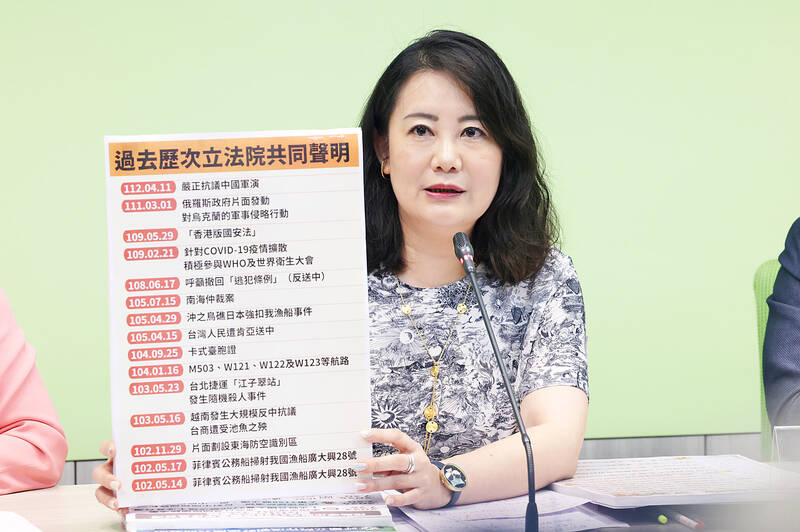The Chinese Nationalist Party (KMT) is to propose a motion stating that “the Republic of China (ROC) opposes UN Resolution 2758 in the first place” in the new legislative session, KMT lawmakers said yesterday, accusing the Democratic Progressive Party (DPP) of “ideological manipulation.”
While the DPP caucus said it would propose a motion stating that “UN Resolution 2758 does not involve Taiwan,” the KMT believes the motion would jeopardize the national interests of the ROC, as it excludes Taiwan from the nation’s territory, KMT legislators Niu Hsu-ting (牛煦庭), Huang Chien-hao (黃健豪) and Jonathan Lin (林沛祥) said.
To defend the ROC’s sovereign status as an independent nation they would table another motion to reiterate that the nation neither admits nor accepts the view reflected in UN Resolution 2758, the legislators said.

Photo: CNA
UN member states should permit the ROC’s meaningful participation in the UN in accordance with the UN Charter’s principle of universality to facilitate the rights and benefits of the 23.5 million people in Taiwan, Penghu, Kinmen and Matsu, they said.
The KMT legislators also urged President William Lai’s (賴清德) administration to promote the nation’s meaningful participation in the UN and other international organizations, as well as restore diplomatic relations with Taiwan-friendly nations.
US Deputy Secretary of State Kurt Campbell on Wednesday at a congressional hearing in Washington said he agreed that China mischaracterized UN Resolution 2758 by claiming it said “Taiwan is part of China” and it has no legal grounds to join the UN.
Campbell’s remarks were his first on the issue of UN Resolution 2758. He joined the Australian Senate and the Dutch House of Representatives in voicing support for Taiwan with regard to the resolution.
DPP caucus secretary-general Rosalia Wu (吳思瑤) yesterday said she had informed Legislative Speaker Han Kuo-yu (韓國瑜) about the motion and handed a statement to the whips of each caucus prior to the cross-party negotiations, adding that the DPP hopes to negotiate a statement that is acceptable to all parties.
The motion should represent the voices of each party in addition to the DPP, she said.

Nipah virus infection is to be officially listed as a category 5 notifiable infectious disease in Taiwan in March, while clinical treatment guidelines are being formulated, the Centers for Disease Control (CDC) said yesterday. With Nipah infections being reported in other countries and considering its relatively high fatality rate, the centers on Jan. 16 announced that it would be listed as a notifiable infectious disease to bolster the nation’s systematic early warning system and increase public awareness, the CDC said. Bangladesh reported four fatal cases last year in separate districts, with three linked to raw date palm sap consumption, CDC Epidemic Intelligence

The manufacture of the remaining 28 M1A2T Abrams tanks Taiwan purchased from the US has recently been completed, and they are expected to be delivered within the next one to two months, a source said yesterday. The Ministry of National Defense is arranging cargo ships to transport the tanks to Taiwan as soon as possible, said the source, who is familiar with the matter. The estimated arrival time ranges from late this month to early next month, the source said. The 28 Abrams tanks make up the third and final batch of a total of 108 tanks, valued at about NT$40.5 billion

Two Taiwanese prosecutors were questioned by Chinese security personnel at their hotel during a trip to China’s Henan Province this month, the Mainland Affairs Council (MAC) said yesterday. The officers had personal information on the prosecutors, including “when they were assigned to their posts, their work locations and job titles,” MAC Deputy Minister and spokesman Liang Wen-chieh (梁文傑) said. On top of asking about their agencies and positions, the officers also questioned the prosecutors about the Cross-Strait Joint Crime-Fighting and Judicial Mutual Assistance Agreement, a pact that serves as the framework for Taiwan-China cooperation on combating crime and providing judicial assistance, Liang

A group from the Taiwanese Designers in Australia association yesterday represented Taiwan at the Midsumma Pride March in Melbourne. The march, held in the St. Kilda suburb, is the city’s largest LGBTQIA+ parade and the flagship event of the annual Midsumma Festival. It attracted more than 45,000 spectators who supported the 400 groups and 10,000 marchers that participated this year, the association said. Taiwanese Designers said they organized a team to march for Taiwan this year, joining politicians, government agencies, professionals and community organizations in showing support for LGBTQIA+ people and diverse communities. As the first country in Asia to legalize same-sex